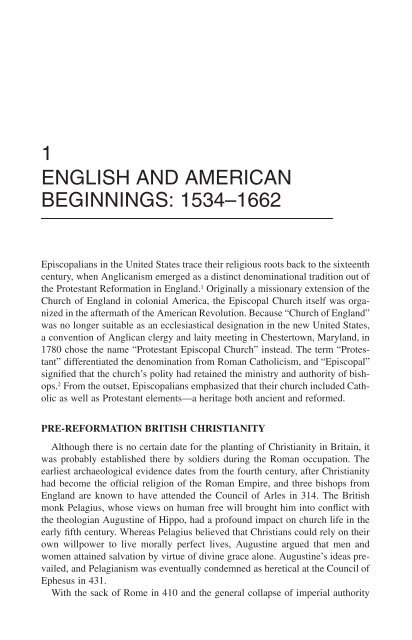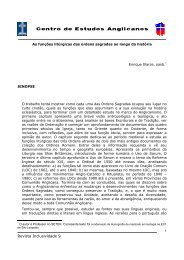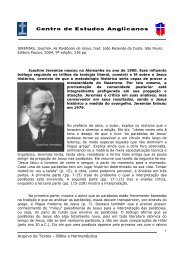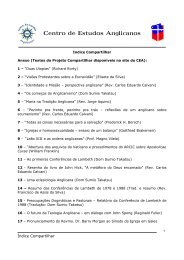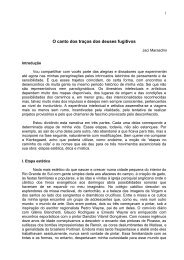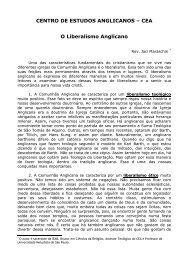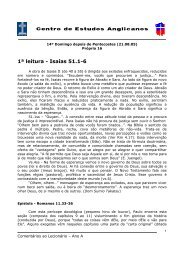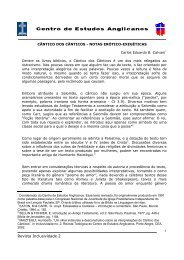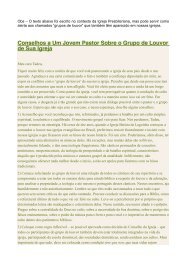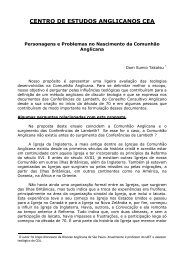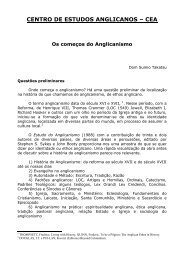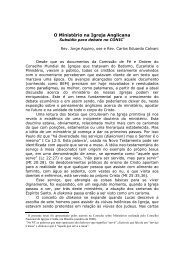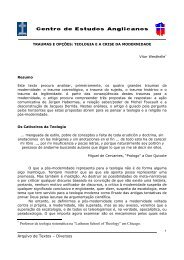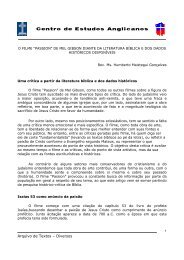- Page 3 and 4: THE EPISCOPALIANS
- Page 5 and 6: THE EPISCOPALIANSDAVID HEINandGARDI
- Page 7: CONTENTSPart OnePart TwoSeries Fore
- Page 10 and 11: viiiSERIES FOREWORDEach of the hist
- Page 12 and 13: xPREFACElishment, a politically, th
- Page 14 and 15: xiiPREFACEIn conclusion, the author
- Page 16 and 17: xivABBREVIATIONS FOR STANDARD SOURC
- Page 19: Part OneTHE EPISCOPALIANS:A HISTORY
- Page 23 and 24: ENGLISH AND AMERICAN BEGINNINGS 5of
- Page 25 and 26: ENGLISH AND AMERICAN BEGINNINGS 7Cr
- Page 27 and 28: ENGLISH AND AMERICAN BEGINNINGS 9or
- Page 29 and 30: ENGLISH AND AMERICAN BEGINNINGS 11e
- Page 31 and 32: ENGLISH AND AMERICAN BEGINNINGS 13a
- Page 33 and 34: 2ANGLICANISM IN COLONIALAMERICA: 16
- Page 35 and 36: ANGLICANISM IN COLONIAL AMERICA 17o
- Page 37 and 38: ANGLICANISM IN COLONIAL AMERICA 19T
- Page 39 and 40: ANGLICANISM IN COLONIAL AMERICA 21D
- Page 41 and 42: ANGLICANISM IN COLONIAL AMERICA 23f
- Page 43 and 44: ANGLICANISM IN COLONIAL AMERICA 25m
- Page 45 and 46: ANGLICANISM IN COLONIAL AMERICA 27o
- Page 47 and 48: ANGLICANISM IN COLONIAL AMERICA 29m
- Page 49 and 50: ANGLICANISM IN COLONIAL AMERICA 31T
- Page 51: ANGLICANISM IN COLONIAL AMERICA 33l
- Page 54 and 55: 36THE EPISCOPALIANScolonies was for
- Page 56 and 57: 38THE EPISCOPALIANSwould have had o
- Page 58 and 59: 40THE EPISCOPALIANScolonists, they
- Page 60 and 61: 42THE EPISCOPALIANSANGLICAN PATRIOT
- Page 62 and 63: 44THE EPISCOPALIANSIn considering t
- Page 64 and 65: 46THE EPISCOPALIANSgiven authority
- Page 66 and 67: 48THE EPISCOPALIANS28. Jonathan Bou
- Page 69 and 70: 4REORGANIZATION IN A NEWNATION: 178
- Page 71 and 72:
REORGANIZATION IN A NEW NATION 53na
- Page 73 and 74:
REORGANIZATION IN A NEW NATION 55A
- Page 75 and 76:
REORGANIZATION IN A NEW NATION 57to
- Page 77 and 78:
REORGANIZATION IN A NEW NATION 59AN
- Page 79 and 80:
REORGANIZATION IN A NEW NATION 61go
- Page 81 and 82:
5UNITY, DIVERSITY, ANDCONFLICT IN A
- Page 83 and 84:
UNITY, DIVERSITY, AND CONFLICT IN A
- Page 85 and 86:
UNITY, DIVERSITY, AND CONFLICT IN A
- Page 87 and 88:
UNITY, DIVERSITY, AND CONFLICT IN A
- Page 89 and 90:
UNITY, DIVERSITY, AND CONFLICT IN A
- Page 91 and 92:
UNITY, DIVERSITY, AND CONFLICT IN A
- Page 93 and 94:
UNITY, DIVERSITY, AND CONFLICT IN A
- Page 95 and 96:
UNITY, DIVERSITY, AND CONFLICT IN A
- Page 97 and 98:
UNITY, DIVERSITY, AND CONFLICT IN A
- Page 99 and 100:
UNITY, DIVERSITY, AND CONFLICT IN A
- Page 101:
UNITY, DIVERSITY, AND CONFLICT IN A
- Page 104 and 105:
86THE EPISCOPALIANSTHE BROAD CHURCH
- Page 106 and 107:
88THE EPISCOPALIANSester, New York,
- Page 108 and 109:
90THE EPISCOPALIANSpressed their wi
- Page 110 and 111:
92THE EPISCOPALIANSin 1549. In fact
- Page 112 and 113:
94THE EPISCOPALIANSgymen as “prie
- Page 114 and 115:
96THE EPISCOPALIANSUnited Offering
- Page 116 and 117:
98THE EPISCOPALIANSareas through th
- Page 118 and 119:
100THE EPISCOPALIANSmoved to Minnes
- Page 120 and 121:
102THE EPISCOPALIANScreate special
- Page 122 and 123:
104THE EPISCOPALIANStwo men were gi
- Page 124 and 125:
106THE EPISCOPALIANSNOTES1. AR, 243
- Page 126 and 127:
108THE EPISCOPALIANS45. George M. M
- Page 128 and 129:
110THE EPISCOPALIANSwhat the Confer
- Page 130 and 131:
112THE EPISCOPALIANSfundamentalists
- Page 132 and 133:
114THE EPISCOPALIANSwhen the Episco
- Page 134 and 135:
116THE EPISCOPALIANSirreligious. Br
- Page 136 and 137:
118THE EPISCOPALIANSAlthough sharpl
- Page 138 and 139:
120THE EPISCOPALIANS(7,200), it was
- Page 140 and 141:
122THE EPISCOPALIANStime “when Am
- Page 142 and 143:
124THE EPISCOPALIANSJuly 1943. At t
- Page 144 and 145:
126THE EPISCOPALIANSyears; Pauli Mu
- Page 146 and 147:
128THE EPISCOPALIANSAmerican societ
- Page 148 and 149:
130THE EPISCOPALIANSanese-American
- Page 151 and 152:
8CHANGING TIMES: 1958-2003The early
- Page 153 and 154:
CHANGING TIMES 135ment prior to 196
- Page 155 and 156:
CHANGING TIMES 137most qualified pe
- Page 157 and 158:
CHANGING TIMES 139THE ORDINATION OF
- Page 159 and 160:
CHANGING TIMES 141women, they charg
- Page 161 and 162:
CHANGING TIMES 1431974) was consecr
- Page 163 and 164:
CHANGING TIMES 145divorce, contrace
- Page 165 and 166:
CHANGING TIMES 147Anglicanism viewe
- Page 167 and 168:
CHANGING TIMES 149these schismatic
- Page 169 and 170:
CHANGING TIMES 151Episcopalians had
- Page 171 and 172:
CHANGING TIMES 153were prepared to
- Page 173 and 174:
CHANGING TIMES 155whose structure o
- Page 175 and 176:
CHANGING TIMES 15737. Hiatt, “How
- Page 177:
CHANGING TIMES 15984. “The Dissen
- Page 181 and 182:
AAYRES, ANNE (3 January 1816, Londo
- Page 183 and 184:
BBLAIR, JAMES (May 1656?, Alvah, Sc
- Page 185 and 186:
BLISS, WILLIAM DWIGHT PORTER 167Cal
- Page 187 and 188:
BOYLE, SARAH PATTON 169battle over
- Page 189 and 190:
BRAGG, GEORGE FREEMAN JR. 171Bounda
- Page 191 and 192:
BRECK, JAMES LLOYD 173While he was
- Page 193 and 194:
BRIGGS, CHARLES AUGUSTUS 175J. Pers
- Page 195 and 196:
BROOKS, PHILLIPS 177reunion churche
- Page 197 and 198:
BROOKS, PHILLIPS 179ters of Phillip
- Page 199 and 200:
CHANDLER, THOMAS BRADBURY 181Dewey
- Page 201 and 202:
CHASE, PHILANDER 183and Episcopal m
- Page 203 and 204:
COOPER, ANNA JULIA HAYWOOD 185the s
- Page 205 and 206:
CRAM, RALPH ADAMS 187Women Writers,
- Page 207 and 208:
CRUMMELL, ALEXANDER 189West Africa,
- Page 209 and 210:
CUTLER, TIMOTHY 191He was elected a
- Page 211 and 212:
DDANIELS, JONATHAN MYRICK (20 March
- Page 213 and 214:
DEKOVEN, JAMES 195as a tutor at Nas
- Page 215 and 216:
DEMBY, EDWARD THOMAS 197DEMBY, EDWA
- Page 217 and 218:
DUBOSE, WILLIAM PORCHER 199Confeder
- Page 219 and 220:
EELY, RICHARD THEODORE (13 April 18
- Page 221 and 222:
EMERY, JULIA CHESTER 203Margaret Th
- Page 223 and 224:
GALLAUDET, THOMAS 205warm manner, G
- Page 225 and 226:
GARDINER, ROBERT HALLOWELL III 207
- Page 227 and 228:
GRISWOLD, ALEXANDER VIETS 209The ce
- Page 229 and 230:
GRISWOLD, ALEXANDER VIETS 211Biblio
- Page 231 and 232:
HARE, WILLIAM HOBART 213public caus
- Page 233 and 234:
HINES, JOHN ELBRIDGE 215While on a
- Page 235 and 236:
HINMAN, SAMUEL DUTTON 217James Lloy
- Page 237 and 238:
HOBART, JOHN HENRY 219of New York 1
- Page 239 and 240:
HOLLY, JAMES THEODORE 221his larger
- Page 241 and 242:
HOPKINS, JOHN HENRY 223burgh, 1818-
- Page 243 and 244:
HUNTINGTON, FREDERIC DAN 225Charles
- Page 245 and 246:
HUNTINGTON, JAMES OTIS SARGENT 227a
- Page 247 and 248:
HUNTINGTON, WILLIAM REED 229Bibliog
- Page 249 and 250:
IVES, LEVI SILLIMAN 231colonies, le
- Page 251 and 252:
JJARRATT, DEVEREUX (17 January 1733
- Page 253 and 254:
JONES, ABSALOM 235the Society for t
- Page 255 and 256:
KKEMPER, JACKSON (24 December 1789,
- Page 257 and 258:
LLAWRENCE, WILLIAM (30 May 1850, Bo
- Page 259 and 260:
LEE, ROBERT EDWARD 241colonel, U.S.
- Page 261 and 262:
LE JAU, FRANCIS 243sionary of the S
- Page 263 and 264:
MANNING, WILLIAM THOMAS 2451903 Mor
- Page 265 and 266:
MCILVAINE, CHARLES PETTIT 247L. Phi
- Page 267 and 268:
MEADE, WILLIAM 249of anti-American
- Page 269 and 270:
MILES, JAMES WARLEY 251Episcopal Ch
- Page 271 and 272:
MORGAN, EMILY MALBONE 253MORGAN, EM
- Page 273 and 274:
MUHLENBERG, WILLIAM AUGUSTUS 255suc
- Page 275 and 276:
MURPHY, EDGAR GARDNER 257attempted
- Page 277 and 278:
MURRAY, PAULI 259Having suffered fr
- Page 279 and 280:
MURRAY, PAULI 261with Betty Friedan
- Page 281 and 282:
NEWTON, RICHARD HEBER 263Neal was t
- Page 283 and 284:
OOAKERHATER, DAVID PENDLETON (ca. 1
- Page 285 and 286:
ONDERDONK, HENRY USTICK 267Episcopa
- Page 287 and 288:
OTEY, JAMES HERVEY 269BibliographyA
- Page 289 and 290:
PPERKINS, FRANCES (10 April 1880, B
- Page 291 and 292:
PIKE, JAMES ALBERT 273tianity Takes
- Page 293 and 294:
POLK, LEONIDAS 275observed when ref
- Page 295 and 296:
POTTER, HENRY CODMAN 277POTTER, HEN
- Page 297 and 298:
QQUINTARD, CHARLES TODD (22 Decembe
- Page 299 and 300:
RRAINSFORD, WILLIAM STEPHEN (30 Oct
- Page 301 and 302:
RAVENSCROFT, JOHN STARK 283she had
- Page 303 and 304:
RUSSELL, JAMES SOLOMON 285being rai
- Page 305 and 306:
SSCARLETT, WILLIAM (3 October 1883,
- Page 307 and 308:
SCHERESCHEWSKY, SAMUEL ISAAC JOSEPH
- Page 309 and 310:
SCUDDER, VIDA DUTTON 291came under
- Page 311 and 312:
SHERRILL, HENRY KNOX 293Returning t
- Page 313 and 314:
SHOEMAKER, SAMUEL MOOR 295Bibliogra
- Page 315 and 316:
SMITH, WILLIAM 297Anglican Fellowsh
- Page 317 and 318:
STANTON, ELIZABETH CADY 299Johnstow
- Page 319 and 320:
STOWE, HARRIET BEECHER 301mon Praye
- Page 321 and 322:
STUCK, HUDSON 303Catholic priest Da
- Page 323 and 324:
STUCK, HUDSON 305Stuck from Texas t
- Page 325 and 326:
TUCKER, HENRY ST. GEORGE 307work am
- Page 327 and 328:
TYNG, STEPHEN HIGGINSON 30986, Tutt
- Page 329 and 330:
WWASHINGTON, PAUL MATTHEW (26 May 1
- Page 331 and 332:
WEDEL, CYNTHIA CLARK 313WEDEL, CYNT
- Page 333 and 334:
WEEMS, MASON LOCKE 315Mason (“Par
- Page 335 and 336:
WHITE, WILLIAM 317were essentially
- Page 337 and 338:
WHITEFIELD, GEORGE 319BibliographyA
- Page 339 and 340:
WHITTINGHAM, WILLIAM ROLLINSON 321W
- Page 341 and 342:
WILLIAMS, PETER JR. 323In 1865, aft
- Page 343 and 344:
WILMER, RICHARD HOOKER 325support o
- Page 345 and 346:
A CHRONOLOGY OF THEEPISCOPAL CHURCH
- Page 347 and 348:
A CHRONOLOGY OF THE EPISCOPAL CHURC
- Page 349:
A CHRONOLOGY OF THE EPISCOPAL CHURC
- Page 352 and 353:
334BIBLIOGRAPHIC ESSAYAustralia, ar
- Page 354 and 355:
336BIBLIOGRAPHIC ESSAY(Harrisburg,
- Page 356 and 357:
338BIBLIOGRAPHIC ESSAYtended to dis
- Page 358 and 359:
340BIBLIOGRAPHIC ESSAYsees clear ch
- Page 360 and 361:
342BIBLIOGRAPHIC ESSAYappear in the
- Page 362 and 363:
344BIBLIOGRAPHIC ESSAYCharles R. He
- Page 364 and 365:
346BIBLIOGRAPHIC ESSAYment between
- Page 366 and 367:
348BIBLIOGRAPHIC ESSAYWomen’s Mov
- Page 368 and 369:
350Ritualism, controversy over;Trac
- Page 370 and 371:
352conflicts with, 35-38, 40; durin
- Page 372 and 373:
354George III (King). See AmericanR
- Page 374 and 375:
356Mays, Benjamin, 123McGee, Eleano
- Page 376 and 377:
358Ritualism, controversy over, 91-
- Page 378 and 379:
360opening of, 270, 280; School ofT
- Page 381:
ABOUT THE AUTHORSDAVID HEIN teaches


